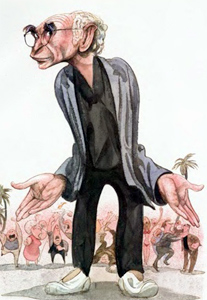
The Lydia Ko approach |
Ice cool Kiwi golfer Lydia Ko is driven to succeed
by SIMON PLUMB
November 2014
Ten years ago, when Lydia Ko first walked into the office of mental performance coach David Niethe, she was just seven
years old.But even then, beyond the hours spent on the practice range, putting green and even at school, Ko was working
on what would become her defining ability: psychological strength.
Before Ko claimed a $1.9 million jackpot last week - winning both the LPGA's season-long Order of Merit and the Tour
Championship - her first year as a professional had already cemented a global reputation for a rare calmness under
pressure, a startling maturity way beyond Ko's teenage years.
Last Monday things went to a new level. With the eyes of the golfing world set on the start of the lucrative,
sudden-death playoff in Florida, 24-year-old Carlota Ciganda was on edge: her Iberian temperament twitching in
full view.
In comparison, 17-year-old Ko was so relaxed she was yawning.
As much as Ko's golfing performances have stunned the world in her fledgling year, it's the way in which she's done
it that has struck a chord and baffled former greats and commentators.
While grown men around the world fizz with rage during their weekly hack around the links, this 17-year-old is
as serene as it gets - and that includes on the elite men's game. And that, says Neithe, is the lesson.
Because believe it or not, Ko actually battles nerves.
|
"Lydia is no different in that she does get nervous. Where she is very different, though, is
her desire to control it," said Niethe.
"One of the first things we worked on was she used to get really anxious on the first tee. So we went through
breathing exercises just to control the physiology."
"What it comes down to is a real desire to develop a behaviour. It's self management and self control - and
Lydia has incredible self control. You do not see her upset, neither do you see her overly excited. The time
for that is after she has finished playing. What we see on a Saturday games is people who get down on themselves,
or we get the other extreme with people throwing clubs. And they wonder why they can't progress."
|

David Niethe
|
"What we're talking about is a formula that will change a golfer's life. You truly have to understand that
getting upset does not help you to improve your performance. Yet people beat themselves up day in, day out."
One of the first building blocks Niethe placed in Ko's mind was getting her to understand the need for
equilibrium - maintaining a constant mental state rather than giving in to emotion.
Understanding it is one thing, having the discipline to do it is another entirely.
"I'm constantly asked, 'What's the secret with Lydia?' The challenge is about 'getting it'. She actually just goes
out there and has fun. I think in general people try and complicate things."
"One of the things I teach is called the performance window. In that window we have assertive behaviour, assertive
physiology and everything that is habitual.
The key - and this is why Lydia is so damn good - is consistency. People have got to observe her behaviour,
and this is what we've worked on. In the performance window we don't get passive, we don't get aggressive,
we maintain an assertive mindset."
"If you're confident out there having fun, then you can perform in a way where even if you hit a bad shot, you can stay in that performance window."
Niethe, who began his career as an athlete and was a former New Zealand strongman competitor, has since turned his
prime professional focus from muscular to psychological strength.
But perhaps the most startling thing is Niethe's unequivocal confidence in what Ko still has left to show. We are only
just seeing, he says, the tip of the iceberg.
"Lydia's only just started and she's still maturing as an individual. I think what we're about to witness is one
of the greatest decades ever in women's golf," he said.
"I don't think anything's going to change for her. Lydia will be this country's first female in the Hall of Fame and
when that time comes, probably one of the youngest ever too."
|
"What's absolutely vital to Lydia's success is humble confidence in her performance. She's very proud of
herself, too. She works bloody hard. And let's face it, hard work always pays off."
|

|
Return to Top links
|
Larry's Dilemmas |
Anger, Denial, Bargaining, Depression,
and finally Acceptance
by Larry David
|
|
|
On the par-3, 175-yard fourteenth hole at Riviera, I hit my tee shot a mere ninety yards and a physics-defying thirty degrees to the rightóalmost sideways. Itís a miracle I got my right leg out of the way, or I could have shattered it with the club. As I walked to the ball, I remarked to my friend that after seventeen years of playing this course Iíd never seen someone hit a ball anywhere near where mine ended up. He had never seen it, either. ďWhatís more,Ē I said, ďI couldnít care less.Ē My friend was taken aback. But I meant it. I didnít care, and I didnít particularly care about the next shot, either. I felt liberated, not unlike the way I felt when my wife left me, except this time I didnít take up skipping.
|

|
|
Finally, after years of pain and struggle, I had accepted the fact that I would never be a good golfer. No matter how many hours I practiced, no matter how many instructors I saw, how many books and magazines I read, or how many teaching aids I tried. Then it hit me. According to Dr. Elisabeth KŁbler-Rossís book ďOn Death and Dying,Ē Acceptance was the final stage of grief that terminal patients experience before dying.
The others being Anger, Denial, Bargaining, and Depression. I was in the final stage! When I started thinking about it, I realized that Iíd gone through every one of those stages, but not as a terminal patient . . . as a golfer.
|

|
|
My first stage: Anger. There was a time when I was always angry on the course. Driving fast in the cart. Throwing clubs. Constantly berating myself. ďYou stink, four-eyes! You stink at everything. You canít even open a bottle of wine! You canít swipe a credit card at the drugstore! You canít swipe. And youíve never even been to the Guggenheim. The Guggenheim! And call your parents, you selfish bastard!Ē Then Iíd walk off the course and vow never to play again, only to return the following week for more of the same. I hardly ever finished a round. Once, I bought a brand-new set of clubs, and then, after a particularly terrible day, I gave them to the caddy at the sixteenth hole and left.
|

|
|
The Anger phase lasted for years, and then I entered the next phase, Denial. ďAll I need are some lessons,Ē I told myself. ďWhy should everyone else be able to do it and not me? Why are they good? Iím coŲrdinated. I have a jump shot! I can go to my left. Obviously I have it in me. I have it in me! Next year, Iíll go to Orlando and spend a week taking lessons with Leadbetter. I donít care what it costs. How can you spend a week with Leadbetter and not get better? Itís impossible.Ē But I did, and I didnít.
|

|
|
The third stage was Bargaining, and I did my share of that. ďPlease, God. All I want to do is hit the ball. What is it You want? Good deeds? Give me a swing and Iíll give You good deeds up the wazoo. Iíll help sick kids, the homeless . . . well, sick kids. Iíll stop all the mocking. Iíll give up cookies, coffee, coffee cake, cashmere. Iíll go to temple. Is that what You want? Temple? Done! Can I bring my BlackBerry? O.K., no BlackBerry, I promise! Just let me hit the ball! What do You care?Ē He didnít. What kind of God wonít let me hit the ball? What did I ever do to Him? He took my hair, I didnít complain. I joked about it! I was a model bald man. Was it the TV show? Did He not like the show? Too mean? Iíll make it nicer! I can be nice. ďTell You whatóIíll visit my parents in Florida three times next year. Thatís right, You heard me. Three times! . . . Did I say three? Threeís crazy. No one can survive three trips down there. Itís suicide. Letís make it two. What do You say? Two trips to Florida! Iím only human!Ē And, by the way, I wasnít even asking to hit every shot. Or even every other shot. Or even every third shot. I said, ďGod, let me hit the ball every fourth shot and Iíll be happy.Ē Every fourth shot! But He didnít. He wouldnít. He wonít.
|


|
|
Then I drifted into the next stage, Depression. I was never going to be good. Never. Think what I couldíve done with all that time. Learned French. Piano. Iíd be playing Chopin now if it werenít for golf. Playing Chopin for Julie Delpy. But instead I wasted my life on this game. It looked so easy. The ball just sits there. Any idiot could do it. But every instinct I had was wrong. Youíre supposed to hit the ball down to make it go up. Thatís absurd. I want to hit it up to make it go up. When I try to hit down, itís like Iím splitting a log with an axe. All I do is chop up the course. And then thereís this one: the easier you swing, the farther the ball goes. How can that be? So you hit down to make it go up and swing easy to make it go far?
|

|
|
And now I find myself in the final stage, Acceptance. I will never be good. There, I said it. I like saying it. Iíll say it again: Iíll never be good. Itís just not something Iím suited for. Thatís O.K. Iím good at other things. What those are I have no idea. But Iím sure there are some. Flossing and dishwashing come to mind. Getting people I canít stand to like me is another. But golf ? No. I will never stand over the ball without considering the disaster about to befall me. Iíll never line up a putt and think Iíll make it. Never face a chip without fearing the decel. And yet Iíll continue to play, because I do hit some good shots, especially when Iím on the driving range.
I actually hit some great range shots. What the hell is that? Iíve had swing compliments on the range. ďI love your tempo,Ē a woman once said to me. Thatís rightóI have good tempo. Iíve had many other range compliments that I wonít bore you with, but, believe me, Iím an eight or a nine on the range. So itís clearly psychological. I wonder . . . what if I blindfolded myself ?
Is it possible?!
Have I stumbled upon the Secret?
It makes sense.
|

|
|
The reason I canít hit the ball is that I can see it!
Tomorrow Iím going to play blindfolded, and if that doesnít work then Iíll definitely and unequivocally accept Acceptance.
I just want to try this blindfold idea.
I have a very good feeling about it.
Very good.
|

|
Return to Top links
|
Golfing Mind Games |
No Big Moment Needed
As soon as we call it a ďbigĒ moment, weíve already introduced at least a little tension to our games from inside the mind. We suddenly feel weíre going to have to add something extra beyond what we normally have to give. That extra mind additive should help us to play better. Right?
Not surprisingly, itís this very mindset that tends to immediately add needless pressure to our games. Itís no different than what happens to a lot of us when we have a shot to win whatever (the body locks up as the hands start to shake or fidget around).
Far better to train the brain to stay in the Now moment, play it a shot -at -a -time, ignore the what ifís and stay in the Present moment, hopefully again until the end of play on that wonderful day.
Let It Be
One of the most powerful emotions within the mind game is that of satisfaction. And while it might seem like a pretty low key or chilled energy at first, which it is, there is more importantly no internal tension or resistance in it, either. We now give up on thinking that we have to arrive at the course only to remind ourselves that we want to play great golf and get ourselves all fired up.
Energy doesn't work that way. We go neutral with our emotions instead which is a highly positive approach within the mind game which allows us to get out of our own way.
Consistency ?
Perhaps no major sport more than golf has us believing that we can control conditions outside our control. We cannot.
Other sports have lots of moving players and parts, whereas in golf there is us and a ball that is at rest. Furthermore, we are deluded into the concept of a consistency that does not exist. The human brain is not wired for consistency, meaning that we are setting ourselves up for a lot of disappointment and frustration if we make sameness the goal.
We eventually come to the realization that mood and attitude are the only things we can control. Trying to control conditions outside of us, and then being unhappy when we don't, becomes a the biggest illusion of all.
|
|
Return to Top links
|
|


